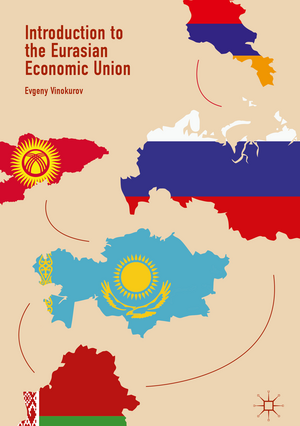Introduction to the Eurasian Economic Union
Autor Evgeny Vinokuroven Limba Engleză Hardback – 7 aug 2018
This book presents a detailed qualitative and quantitative assessment of the Eurasian Economic Union, including the history of Eurasian integration, the macroeconomy of EAEU member states, an assessment of trade and investment links, a descriptive analysis of the EAEU Treaty, an analysis of Eurasian institutions, the sociology of integration, the EAEU’s emerging foreign economic policy, relations with the EU and China, the EAEU’s position on One Belt One Road policies, and its mid-term policy agenda. This primer text will be of interest and value for students, academics and practitioners working in economic policy and business communities and interested in the history and development of the Eurasian Economic Union.
| Toate formatele și edițiile | Preț | Express |
|---|---|---|
| Paperback (1) | 316.16 lei 6-8 săpt. | |
| Springer International Publishing – 21 dec 2018 | 316.16 lei 6-8 săpt. | |
| Hardback (1) | 236.47 lei 3-5 săpt. | +24.19 lei 6-12 zile |
| Springer International Publishing – 7 aug 2018 | 236.47 lei 3-5 săpt. | +24.19 lei 6-12 zile |
Preț: 236.47 lei
Nou
Puncte Express: 355
Preț estimativ în valută:
45.25€ • 48.39$ • 37.73£
45.25€ • 48.39$ • 37.73£
Carte disponibilă
Livrare economică 27 martie-10 aprilie
Livrare express 12-18 martie pentru 34.18 lei
Preluare comenzi: 021 569.72.76
Specificații
ISBN-13: 9783319928241
ISBN-10: 3319928244
Pagini: 202
Ilustrații: XXIII, 211 p. 21 illus.
Dimensiuni: 148 x 210 x 22 mm
Greutate: 0.43 kg
Ediția:1st ed. 2018
Editura: Springer International Publishing
Colecția Palgrave Macmillan
Locul publicării:Cham, Switzerland
ISBN-10: 3319928244
Pagini: 202
Ilustrații: XXIII, 211 p. 21 illus.
Dimensiuni: 148 x 210 x 22 mm
Greutate: 0.43 kg
Ediția:1st ed. 2018
Editura: Springer International Publishing
Colecția Palgrave Macmillan
Locul publicării:Cham, Switzerland
Cuprins
1. The History of Eurasian Integration: 1991–2016.- 2. Economic and Social Ties.- 3. EAEU Institutions.- 4. Common Markets within the Eurasian Economic Union: Movement of Goods, Services, Labour, and Capital.- 5. Eurasian Economic Union: Foreign Economic Relations.- 6. A "Normal" Regional Organization: Explaining Eurasian Integration.- 7. Conclusion.
Notă biografică
Dr Evgeny Vinokurov is Director of the Centre for Integration Studies at the Eurasian Development Bank in Russia. As the founding director of the Centre of Integration Studies, he is responsible for an extensive research agenda which focuses on economic integration. Evgeny has written and edited a number of monographs on regional integration, including Evaluating Regional Organizations: Behind the Smokescreen of Official Mandates; Eurasian Integration: Challenges of Transcontinental Regionalism; and Holding-Together Integration: 20 Years of Post-Soviet Integration (Palgrave Macmillan, 2017, 2012, 2012, co-authored with Alexander Libman). He has published in journals such as the Journal of Common Market Studies, Review of International Political Economy, European Urban and Regional Studies, Russian Journal of Economics, and Post-Communist Economies.
Textul de pe ultima copertă
The Eurasian Economic Union (EAEU), which includes Russia, Kazakhstan, Belarus, Kyrgyzstan, and Armenia, is a new but substantial regional organization. Significant achievements include a common external customs tariff, a customs union and a common labour market: a well-developed institutional environment has emerged to support and advance these processes, ranging from the Eurasian Economic Commission and the EAEU Court to the Eurasian Development Bank and the Eurasian Fund for Stabilization and Development. This major integration achievement also has several drawbacks and ‘stumbling stones’—some due to Russia’s dominant position, some due to the authoritarian nature of political regimes, and some due to dependence on oil and gas exports.
This book presents a detailed qualitative and quantitative assessment of the Eurasian Economic Union, including the history of Eurasian integration, the macroeconomy of EAEU member states, an assessment of trade and investment links, a descriptive analysis of the EAEU Treaty, an analysis of Eurasian institutions, the sociology of integration, the EAEU’s emerging foreign economic policy, relations with the EU and China, the EAEU’s position on One Belt One Road policies, and its mid-term policy agenda. This primer text will be of interest and value for students, academics and practitioners working in economic policy and business communities and interested in the history and development of the Eurasian Economic Union.
This book presents a detailed qualitative and quantitative assessment of the Eurasian Economic Union, including the history of Eurasian integration, the macroeconomy of EAEU member states, an assessment of trade and investment links, a descriptive analysis of the EAEU Treaty, an analysis of Eurasian institutions, the sociology of integration, the EAEU’s emerging foreign economic policy, relations with the EU and China, the EAEU’s position on One Belt One Road policies, and its mid-term policy agenda. This primer text will be of interest and value for students, academics and practitioners working in economic policy and business communities and interested in the history and development of the Eurasian Economic Union.
Caracteristici
Provides comprehensive coverage that serves as a reference on the Eurasian Union for a wide audience Fully up-to-date, incorporating quantitative data to the end of 2016 and factual information to the end of June 2017 Presents a detailed qualitative and quantitative assessment of the Eurasian Economic Union, including the history of Eurasian integration
